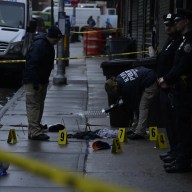By Daniel Arimborgo
The first thing that you notice upon entering El Padrino, the maker of premium handmade cigars in Jamaica Estates, is not the smell of tobacco but of the cedarwood used to line the store's humidors – air-tight cases that keep tobacco fresh. Latin-Caribbean music on speakers also greets you when you enter.
A magazine rack in the middle of the store displays Cigar Aficionado Magazine, which has Dennis Hopper on this month's cover. Inside is a rating of the top tobacco crops by country. Nicaragua comes out on the top, with a 97 percent rating.
Owner Alfonso Londono has just returned from Connecticut, where he has purchased more tobacco.
Londono, a cigar aficionado himself who was born in Colombia, shows a backroom lounge, where customers can relax in plush leather chairs, listen to music, watch television – and, of course, smoke cigars.
Nearby are what look like large lockers which, except for their more opulent style resemble the kind you find in bus stations. But they are humidors, which can be rented by customers to keep their favorite cigar stash fresh. Londono says even a stale cigar can be “brought back to life” in a humidor.
El Padrino, which is Latin for “the Godfather,” gets its name from a charcoal sketch of Marlon Brando, which hangs on a wall in the store. Brando starred in the first movie version of Mario Puzo's novel of the same name.
“'Godfather' sounded too strong,” Londono says, “so we went with the Latin name instead.”
Londono opened the store at 185-04A Union Turnpike four months ago.
“One of the main things about our cigars is they're hand-made,” store manager Harold Roberson says.
“No machines, which can roll the leaf too tightly.”
“When you make a cigar by hand, sometimes it may be too loose or too tight,” Roberson admits, “but you can return those to us. We can also make blends to fit customers' tastes.”
The outer leafs, or “wrappers” as they are called, which are used to wrap the smoking tobacco in contrast to paper for cigarettes come from different countries that supply the store: Indonesia, the Dominican Republic and Connecticut, where a special crop called Connecticut Shade is grown.
Londono says he plans to get flags for the store to represent the countries from which he buys tobacco.
“Right now we're just working with Indonesia and the Dominican Republic,” Londono says. Connecticut Shade has a lighter-shaded leaf wrap.
Victor Abreu, a cigar master from the Dominican Republic, hand rolls the store's cigars during the day and can be seen doing it by the front window. He can roll between 100 and 200 a day.
Abreu starts with a large leaf, – “That's what everyone asks for,” Londono says -and rolls others inside it, After he rolls up the leafy tobacco, which is uncut, he places it in a mold which is later pressed for two hours to tighten the roll.
The cigars are then ready to smoke, though still a little too moist for some tastes.
El Padrino also sells all the products a cigar lover could ever need.
In addition to the boxes of cigars and bags of tobacco inside the glass display-case humidors – which must be kept at 70 percent humidity all the time – are lighters, traveldors, or portable humidors, ash trays, and end-cutters.
Londono, who also owns an American continental cuisine restaurant in Jackson Heights, says he intends to open other cigar stores after this initial venture and start a wholesale operation.
Cigars can be bought by the box or individually.
“As far as taste and flavor, we can compete with any cigar sold in Manhattan,” Londono says.
Reach reporter Daniel Arimborgo by e-mail at timesledgr@aol.com or call 229-0300 ext. 141.
































